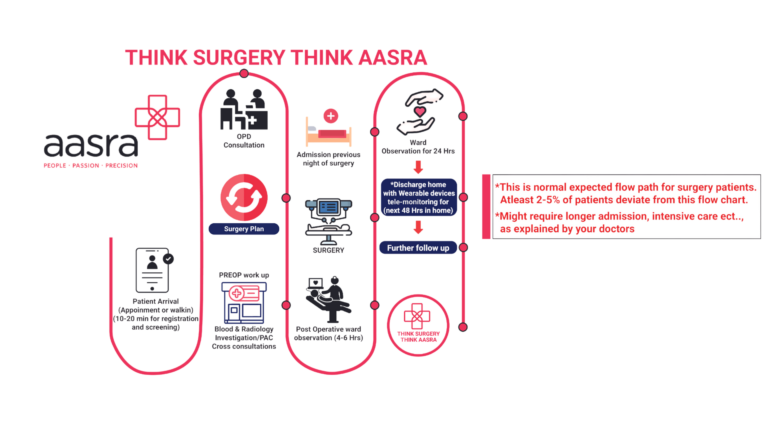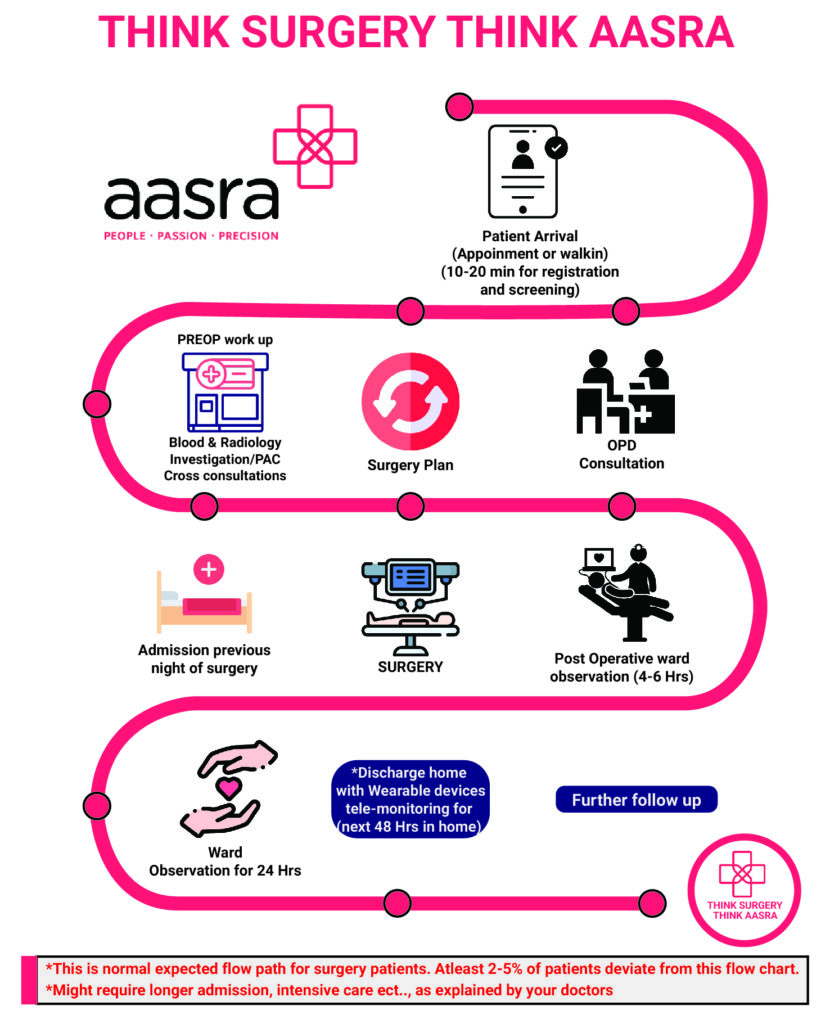Advanced knee joint replacement is a term that is used to describe a range of surgical techniques and technologies that are used in knee replacement surgery. These techniques and technologies are designed to improve the accuracy and precision of the surgery, as well as the long-term function and durability of the knee implant.
Some examples of advanced knee joint replacement techniques and technologies may include:
- Robotic-assisted knee replacement surgery: In this type of surgery Robotic arm assisted surgeon taking very minimal and accurate bone cuts and to align & position the knee implants. The robotic arm is equipped with advanced imaging technology that allows the surgeon to see a 3D model of the knee and ensure that the implant is aligned correctly. This can improve the long-term function of the knee.
- Customized knee implants: In some cases, advanced knee joint replacement may involve the use of customized knee joint implants that are designed to fit the specific shape and size of the patient's knee. This will improve the fit and function of the implant and provide better long-term results.
- Minimally invasive surgical techniques: Advanced knee joint replacement may also involve the use of minimally invasive surgical techniques, such as smaller incisions and specialized instruments, to reduce the amount of injury to the surrounding tissue and minimize scarring. This can help speed up the recovery time and improve the patient's overall experience.
Overall, advanced knee joint replacement is a term that refers to techniques and technologies that are used to improve the accuracy and precision of knee replacement surgery, as well as the long-term function and durability of the knee implant. These techniques and technologies can help improve the patient's experience and achieve better surgical outcomes.
Knee arthritis, also known as osteoarthritis of the knee, is a common condition that affects the knee joint. It is estimated that about 30-40% in India have knee osteoarthritis, and the prevalence of the condition increases with age. Knee arthritis is more common in women than in men, and it is also more common in individuals who are overweight or obese.
Knee osteoarthritis is a condition which cause pain, stiffness, and swelling in the knee. It is caused due to wearing away of the cartilage in the knee joint, which lead to the bones rubbing against each other. Over time, this will cause the knee joint to become damaged and result in reduced mobility and difficulty performing daily activities.
If you are experiencing knee pain and discomfort, it's important to see your doctor for a proper diagnosis and treatment plan. Treatment options for knee osteoarthritis may include medication, physical therapy, and knee replacement surgery in severe cases
Knee joint replacement, also known as knee replacement surgery, is a surgical procedure that is used to treat severe knee pain and disability caused by conditions such as osteoarthritis. The main benefit of knee joint replacement is that it can help reduce knee pain and improve knee function, allowing individuals to return to their normal activities and improve their overall quality of life. Some specific benefits of knee joint replacement may include:
- Relief from chronic knee pain: Knee joint replacement can help relieve chronic knee pain that has not responded to other forms of treatment, such as physical therapy or medication. By removing the damaged cartilage and bone in the knee joint and replacing them with an artificial implant, knee joint replacement can help reduce pain and improve knee function.
- Improved mobility: After knee joint replacement, many individuals are able to move around more easily and comfortably. This can improve their ability to perform daily activities, such as walking, climbing stairs, and getting in and out of a car.
- Better quality of life: By reducing knee pain and improving mobility, knee joint replacement can help improve an individual's overall quality of life. This can include an increased ability to participate in activities they enjoy, improved social interactions, and a greater sense of independence.
- Long-term benefits: In general, knee joint replacement is a highly effective surgical procedure, with a high success rate and long-term benefits. The average lifespan of a knee replacement is about 20 years, although some people may need to have the surgery redone after 10 to 15 years.
Overall, the main benefit of knee joint replacement is the relief from long standing knee pain and the improvement in knee function. This can help individuals return to their normal activities and improve their overall quality of life.
Conventional knee replacement surgery and robotic-assisted knee replacement surgery are both surgical procedures that are used to treat knee pain and disability caused by conditions like osteoarthritis. However, there are several key differences between the two:
- Procedure: Conventional knee replacement surgery is performed using a traditional surgical approach, where the surgeon makes an incision in the knee and uses specialized instruments to remove the damaged cartilage and bone in the knee joint. In contrast, robotic-assisted knee replacement surgery uses a robotic arm to assist the surgeon in removing damaged cartilage & bone, aligning and positioning the knee implant.
- Precision: Robotic arm used in robotic-assisted knee replacement surgery is equipped with advanced imaging technology.The surgeon is able to see a 3D model of the knee and ensure that the implant is aligned correctly. This can improve the long-term function of the knee. Where in, conventional knee replacement surgery relies on the surgeon's manual skills and judgment to align the implant, which may not be as precise.
- Recovery time: Robotic-assisted knee replacement surgery is less invasive than conventional surgery, hence patients may experience a faster recovery time. This means they can return to their normal activities earlier and with less discomfort. In contrast, patients who undergo conventional knee replacement surgery may need a longer period of recovery and rehabilitation.
Overall, the main difference between conventional knee replacement surgery and robotic-assisted knee replacement surgery is the use of a robotic arm to assist in the surgical procedure. This can improve the precision of the surgery and result in a faster recovery time for the patient. However, not all patients are candidates for robotic-assisted knee replacement surgery, and you should talk to your doctor to determine if this type of surgery is right for you.
Knee replacement surgery, also known as knee joint replacement, is usually recommended for individuals who are experiencing long standing knee pain and discomfort that has not improved with other forms of treatment. This surgery may be an option for individuals who have severe osteoarthritis, long standing knee pain, and limited mobility. In general, knee replacement surgery is recommended for individuals who have a significant impairment in their ability to perform daily activities as a result of their knee condition.
Robotic-assisted knee replacement surgery is a type of minimally invasive knee replacement surgery that uses a robotic arm to help the surgeon precisely remove damaged bone & cartilage and align and position the knee implant. This type of surgery may offer several benefits over traditional knee replacement surgery, including:
- Accurate implant alignment: The Robot used in this type of surgery is equipped with advanced imaging technology that allows the surgeon to see a 3D model of the knee and ensure that the implant is aligned correctly. This can help improve the long-term function of the knee.
- Smaller incisions: Because the robotic arm is able to make more precise movements than a human hand, the surgeon can use smaller incisions to access the knee joint. This can reduce the amount of scarring and trauma to the surrounding tissue.
- Faster recovery: Because robotic-assisted knee replacement surgery is less invasive than traditional surgery, patients will experience a faster recovery time. This means they can return to their normal activities sooner and with less discomfort.
- Better range of motion: Because the robotic arm is able to align the knee implant with precision, patients will experience better range of motion and flexibility in their knee after surgery. This can improve their overall quality of life.
Overall, the benefits of robotic-assisted knee replacement surgery may include more accurate implant alignment, smaller incisions, faster recovery, and better range of motion. However, it's important to note that this type of surgery is not appropriate for everyone, and you should talk to your doctor to determine if it's right for you.
There are many different causes of knee pain and reduced knee function, but some of the most common include:
- Osteoarthritis: This is a common form of arthritis that occurs when the cartilage in the knee joint wears away, causing the bones to rub against each other. This can lead to pain, stiffness, and swelling in the knee.
- Meniscus tears: The meniscus is a piece of cartilage that acts as a shock absorber in the knee. Tears in the meniscus can be caused by sudden twisting or turning movements, and can lead to pain and reduced knee function.
- Anterior cruciate ligament (ACL) injuries: The ACL is one of the main ligaments in the knee, and injuries to this ligament can cause pain, swelling, and instability in the knee.
- Patellofemoral syndrome: This condition occurs when the patella (kneecap) does not move smoothly in the groove at the end of the thigh bone. This can cause pain and discomfort in the knee.
- Baker's cyst: A Baker's cyst is a fluid-filled sac that develops behind the knee. This can cause swelling and pain in the knee, as well as a feeling of tightness in the back of the knee.
Other causes of knee pain and reduced knee function include gout, bursitis, and overuse injuries. If you are experiencing knee pain or reduced knee function, it's important to see your doctor for a proper diagnosis and treatment plan.
The average lifespan of a knee replacement is about 20 years, although some people may need to have the surgery redone after 10 to 15 years. The incidence can vary depending on a number of factors, such as the type of implant used, the person's overall health, and the amount of wear and tear the implant experiences. In general, younger and more active individuals may need to have their knee replacement done sooner than older, sedentary individuals. It's important to follow your doctor's recommendations for post-surgery rehabilitation and care to ensure that your implant lasts as long as possible.
If you are experiencing long standingknee pain and discomfort that has not improved with other forms of treatment, such as physical therapy or medication, you may want to talk to your doctor about whether knee replacement surgery is right for you. Your doctor can help you determine if you are a candidate for the procedure by conducting a physical examination and discussing your medical history and symptoms with you. Some common indications for knee replacement surgery include severe osteoarthritis, severe arthritis, and limited mobility due to pain. In general, knee replacement surgery is recommended for individuals who have tried other forms of treatment without success and who have a significant impairment in their ability to perform daily activities as a result of their knee pain.



















